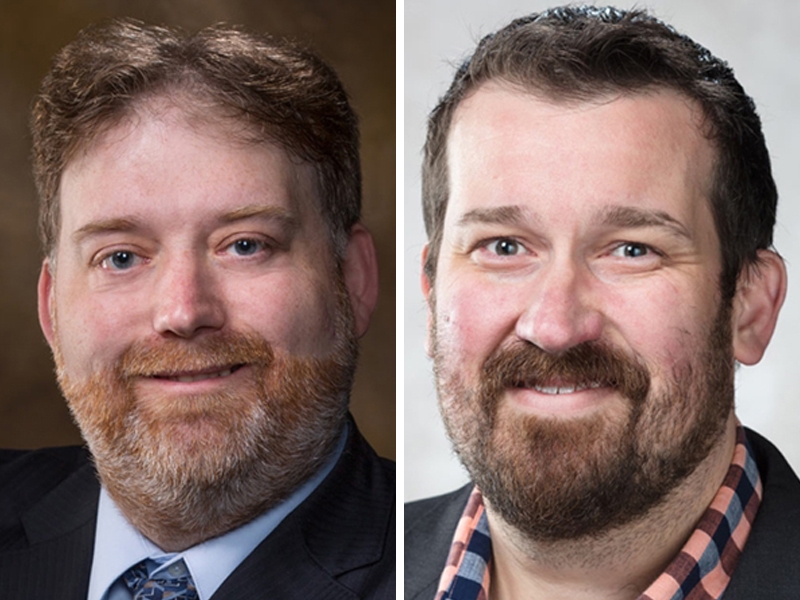Chemistry professors Colin Heyes and Robert Coridan will use a $535,560 award from the National Science Foundation to characterize the structural, optical and electronic properties of semiconducting nanoparticles composed of three or more elements.
The research could lead to new materials for use in light-emitting diodes, lasers, solar-energy conversion, catalysis, chemical and biochemical sensors and biomedical imaging.
“Our goal is to replace toxic elements commonly used in semiconducting nanoparticles, such as cadmium, with more benign ones, such as copper, indium and zinc,” said Heyes, a spectroscopist who measures single nanoparticle optical properties using extremely sensitive fluorescence microscopy.
“However, much less is known about how to control the optical and electronic properties of nanoparticles incorporating these elements.”
Heyes, Coridan and their students will address this lack of knowledge by systematically varying the chemical synthesis of the nanoparticles and analyzing how this affects the resulting atomic structure and, in turn, the optical and electronic properties.
Combining advanced chemical synthesis and analysis tools, they will study quantum dots made of copper-(zinc)-indium chalcogenide and silver-(zinc)-indium chalcogenides. Chalcogenides are compounds formed from chalcogen element atoms, which include sulfur, selenium and tellurium.
Two critical gaps in the understanding of these types of quantum dots are the mechanism underlying the ion-exchange/alloying and the relationship between the structure resulting from the specific reaction conditions and the electronic structure/exciton decay pathways. The researchers’ study will examine these knowledge gaps by systematically synthesizing homogeneously alloyed and heterogeneous/gradient alloyed quantum dots.
“X-ray techniques are well suited to improve our understanding of how the elements are distributed in the nanoparticle, since we can use them to determine the exact oxidation state and immediate environment of these elements at the atomic level,” said Coridan, an expert in X-ray structural analysis.
“This can then be correlated to the optical and electrical properties of a single nanoparticle,” Heyes said.
The award will also be used to help recruit and train underrepresented and first-generation undergraduate students into STEM fields through summer workshops at the U of A.
About the University of Arkansas: As Arkansas' flagship institution, the U of A provides an internationally competitive education in more than 200 academic programs. Founded in 1871, the U of A contributes more than $2.2 billion to Arkansas’ economy through the teaching of new knowledge and skills, entrepreneurship and job development, discovery through research and creative activity while also providing training for professional disciplines. The Carnegie Foundation classifies the U of A among the few U.S. colleges and universities with the highest level of research activity. U.S. News & World Report ranks the U of A among the top public universities in the nation. See how the U of A works to build a better world at Arkansas Research and Economic Development News.
Topics
Contacts
Colin Heyes, department of chemistry
Fulbright College of Arts and Sciences
479-575-5607, cheyes@uark.edu
Matt McGowan, science and research communications officer
University Relations
479-575-4246,
dmcgowa@uark.edu
